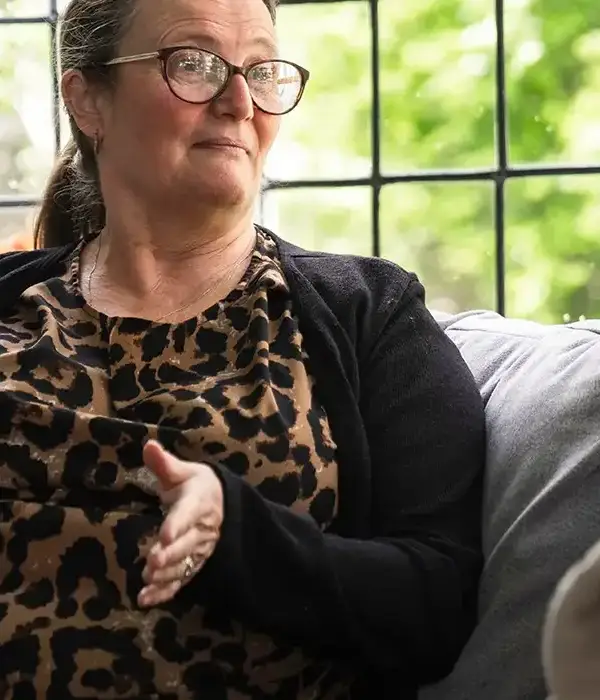Grief Counselling
Losing someone you love can turn your world upside down, leaving you with emotions that feel too heavy to carry alone. During times like this, having a space to talk and feel supported can make a real difference.
Grief counselling offers that space, giving you guidance and encouragement as you work through the pain of loss. It doesn’t take away the sadness, but it can help you find strength, process difficult emotions, and begin to discover a way forward with compassion and support.

Take the First Step Towards Recovery
Steps Together offers personalised support and proven treatments, providing the care, guidance and encouragement you need to move forward with confidence and build a healthier future.

What Is Grief Counselling?
The primary goals of grief counselling are to ease emotional distress, strengthen coping skills, and support a gradual return to everyday life. Counsellors work closely with clients to help them understand their feelings and develop practical ways to manage them.
In outpatient sessions, support may also extend to real-world challenges such as making decisions about funerals or handling estate matters. Beyond these immediate needs, grief counselling fosters acceptance of loss, encourages the rebuilding of life with renewed purpose, and helps clients cultivate resilience.
Goals of Grief Counselling and Support
The primary objectives are to alleviate emotional distress, enhance coping mechanisms, and facilitate a return to daily activities. Counsellors help clients understand their feelings and find effective ways to manage them.
Practical support, such as making decisions about funerals or estate matters, may also be included. Grief counselling promotes acceptance of the loss and encourages rebuilding life with new meaning. It helps clients develop resilience and adapt to life changes caused by bereavement.


Who Can Benefit from Grief Counselling?
Anyone experiencing difficulty after a loss can benefit, especially if grief disrupts daily life or causes intense distress. This includes people who have lost a loved one due to death, but also those facing other kinds of loss, like divorce or job loss.
Grief counselling is helpful for individuals who feel stuck in grief or whose support network is limited. People struggling with depression or anxiety related to grief may find it necessary. It is suitable for all ages and can be delivered one-on-one or in groups for shared support.
Approaches in Grief Counselling
Grief counselling uses different methods to help people cope with loss. These methods vary based on personal needs, the type of loss, and the support system around the person. Each focus aims to guide individuals or groups through grief in a manner best suited to their specific situation.
Individual Counselling
Individual bereavement counselling provides one-on-one support. The counsellor offers a safe space where the person can express feelings without judgement. This approach enables clients to explore their grief at their own pace and discover personal coping strategies.
Techniques may include discussing memories, identifying emotions, or working through challenging moments. Bereavement counselling services exist to help people manage the feelings that accompany loss.
Self-Care During Bereavement
Self-care is a crucial part of managing thoughts and feelings alongside professional support. It involves practices that help maintain physical, emotional, and mental health during difficult times.
Simple self-care strategies include eating a balanced diet, getting sufficient rest, and engaging in gentle exercise. Maintaining routines can provide stability. Emotional self-care may involve journalling, meditating, or engaging in hobbies that provide distraction or calm.
Group Counselling
Group bereavement support brings together people who have experienced loss, and many have. The group shares their stories and listens to others, providing a sense of community. Participants learn from each other’s experiences and coping methods.
A group leader guides discussions and ensures a safe, respectful environment. Group settings also offer social support, encouragement, and gentle accountability. This approach suits individuals who find comfort in shared experiences and want to connect with others who face similar challenges.
Family Grief Therapy
Grief can sometimes affect multiple family members simultaneously. Family grief therapy involves working with multiple members of a family affected by loss. It helps family members communicate their emotions and support one another through their unique grieving processes.
Therapists guide families to honour their shared memories and adapt together to life after loss. Family therapy can prevent long-term emotional distance and promote healing within the household.
Other outpatient counselling services we offer

Grief Counselling Techniques
Grief counselling uses a variety of therapeutic methods to support individuals in processing loss and finding ways to cope with emotional anguish. Techniques may include cognitive approaches to shift unhelpful thought patterns, learning how to express and make sense of grief, and relaxation exercises to reduce stress and anxiety.
Approaches are tailored to the needs of the bereaved, helping them manage emotions, rebuild routines, and gradually adapt to life after loss. Grief counselling offers compassionate guidance through one of the most difficult experiences that life can offer.
Cognitive-Behavioural Techniques
Cognitive-behavioural techniques (CBT) in grief counselling help clients recognise and change negative thoughts about their loss. For example, someone might believe they should not feel sad or guilty. The therapist guides them to challenge these thoughts and replace them with more balanced beliefs and behaviours.
This method often includes setting small goals to face reminders of the loss rather than avoid them. Clients learn new coping skills to manage intense emotions and reduce anxiety. CBT also addresses how grief can affect daily life, helping the person regain routines or social connections.

Benefits of Grief Counselling
Grief counselling provides a safe space where people can express feelings without fear of judgement. Clients often find it easier to talk about their loss openly. This helps them process emotions like sadness, anger, guilt, or confusion.
Grief counselling helps people develop coping strategies to manage ongoing challenges due to prolonged grief. Counsellors teach tools for handling triggers, such as anniversaries or unexpected reminders.
Grief can often make you feel disconnected from others, as if no one fully understands what you’re going through. Grief counselling provides a safe space where your emotions are validated. This can reduce feelings of isolation and loneliness by helping you feel seen, heard, and supported by a trained professional.
Challenges in Grief Counselling
Grief counselling faces several challenges that affect how individuals process their loss. These include dealing with complicated emotions and patterns that resist healing. Additionally, many people struggle to find the support they need due to both personal and social barriers.
Personal Resistance
Being hesitant to talk about loss is a common challenge in grief counselling. Some individuals may avoid discussing their grief due to fear of emotional pain, denial, or being overwhelmed by their emotions. Others may have grown up in environments where expressing feelings was discouraged, making it difficult for them to open up.
This resistance can slow down the recovery process, as unspoken grief often remains unresolved. A skilled counsellor can help create a safe, non-judgmental space where trust can gradually replace resistance. This trust can then allow a person to start talking about their grief, allowing them to start healing.
Fear of Moving On
The fear of moving on or forgetting a loved one is a common emotional hurdle during grief counselling. Many people worry that healing means letting go of cherished memories or dishonouring the person they lost. Many aren’t ready to let go of the person they’ve lost. This fear can create emotional conflict, where progress can feel like betrayal.
Grief counselling helps individuals understand that moving forward doesn’t mean forgetting. Instead, it involves finding healthy ways to remember and honour the loved one while continuing to live a meaningful life filled with purpose and connection.
Addressing Complex Grief
Complex grief occurs when feelings of loss do not improve over time and interfere significantly with daily life. It can involve intense feelings of sadness, anger, or guilt that last for months or years. Therapists must carefully identify these symptoms to provide the right support.
In such cases, standard counselling may not be enough. Techniques often include specialised approaches like prolonged exposure or cognitive behavioural therapy to help clients face painful memories safely.

Grief and Bereavement are Hard but Survivable
Losing someone or something important can be deeply painful, and everyone copes with grief in their own way. There is no right or wrong way to grieve, and it can come in waves, ranging from sadness to anger to confusion to numbness.
Professional grief counselling and outpatient treatment can provide a safe, compassionate space to process these feelings. At Steps Together, we offer support to help you or a loved one navigate loss, find meaning, and begin to heal at your own pace.
Frequently Asked Questions
What can I expect in my first session with a grief counsellor?
The first session usually involves discussing the loss and how it has affected the person. The counsellor will listen carefully and ask questions to understand emotional responses and any challenges faced.
Is it normal to feel angry after a bereavement?
Yes, feeling anger is a common part of the grieving process. It can be directed towards the situation, oneself, or others, and talking about this in counselling can help process these emotions.
How long does the grieving process typically take?
There is no time limit on grief. It may come in waves and change over time. Some people find it lasts months, others years, but bereavement support services can foster healthier adjustment regardless of length.
How can therapy help me deal with the loss of a loved one?
Therapy offers a safe space to express feelings freely. It helps explore grief, reframe thoughts, and develop strategies to manage emotions and everyday tasks during difficult times.
What coping strategies might be recommended by a grief counsellor?
Counsellors may suggest routines like regular meals and sleep, journaling feelings, or joining support groups. Relaxation techniques and setting small, achievable goals can also support healing.
Should children receive counselling after the death of a family member?
Children and young people often benefit from counselling to understand and express their feelings after someone dies. It helps them cope with changes and supports their emotional development during times of loss.





